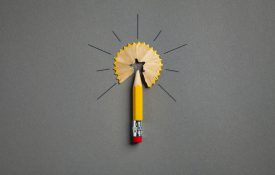-
Blame it on the alcohol? Maybe not, study suggests
msnbc: It’s a trap that most of us have fallen into: making a rash or regrettable decision after a few cold Coors Lights. Blame it on the booze, right? A new study out of the University of Missouri College of Arts and Sciences sheds light on how the brain processes mistakes in the presence of alcohol. In a finding that runs contrary to previous thinking, it turns out we still know we are making mistakes when intoxicated. We just don’t care as much. “I suppose the main implication is that people shouldn’t assume ‘I was drunk’ is a good excuse for doing things one knows he or she shouldn’t be doing,” wrote the study’s author, Dr. Bruce Bartholow of the University of Missouri, in an e-mail.
-
Selbstmitleid lindert Trennungsschmerz
FOCUS: Über eine Scheidung freut sich niemand. Zu der Traurigkeit über die zerbrochene Ehe kommen häufig noch belastende Diskussionen hinzu – wer muss wem wie viel zahlen, wer bekommt das Haus, wie oft hütet wer die Kinder? Trotz aller Querelen lassen sich manche Menschen von dieser Krise nicht unterkriegen, während andere in ein tiefes Loch fallen. Der Schlüssel dafür liegt im Selbstmitleid, sagen Forscher der University of Arizona. Sie sehen Selbstmitleid dabei positiv als empathischen, mitfühlenden Umgang mit sich selbst.
-
OppNet Request for Applications: Mechanistic pathways linking psychosocial stress and behavior (R01)
OppNet, NIH’s Basic Behavioral and Social Science Opportunity Network, just released a new RFA for three-year research projects: Mechanistic pathways linking psychosocial stress and behavior (R01) This OppNet Funding Opportunity Announcement (FOA) encourages research grant applications that propose to investigate basic psychological, social, and environmental mechanisms and processes that link psychosocial stressors and behavior.
-

Rethinking Gifted Education Policy – A Call to Action
Children with extraordinary academic talents should receive the kind of coaching and training opportunities that are typically reserved for performance and athletic abilities, researchers argue.
-
Even a Few Minutes of This Can Boost Happiness, Says Study
Huffington Post: I have been experimenting with mindfulness meditation recently. Originally a Buddhist practice, mindfulness meditation focuses on moment-to-moment awareness, of one's body and its sensations and one's immediate surroundings. When thoughts intrude on this aware state -- as they always do -- you gently let them go as you return to the moment. It's very calming -- and really hard. It's hard because the mind does not want to stop churning out thoughts. I'm told that with time and practice, meditation becomes easier, and what's more that it brings a variety of emotional and health benefits. Those testimonials are why I'm doing this, but I confess the prospect is daunting.
-
Why We’re Lousy Predictors
Smart Money: Humans love predictions. We speculate for years about who will win the next presidential election. We fill out Final Four tournament brackets. We check the seven-day forecast even though the morning newscast is often wrong about the weather for that night. And, of course, we constantly try to guess whether an investment is on its way up or way down. The problem with all this predicting: We're terrible at it. Studies routinely show that humans are generally worse at forecasting things like elections, basketball tournaments and stock-market moves than a chimp with a dartboard. But why are we so bad at it?

